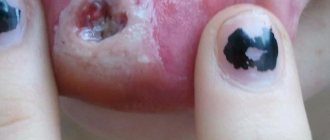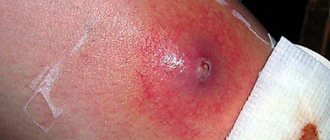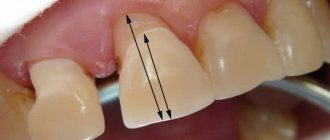Tongue piercing – what consequences can a fashionable hobby lead to?
Piercing various parts of the body is a fashionable hobby that has become popular among young people for quite some time. Many people choose the tongue as the place for the piercing, since here the earring can always be hidden from prying eyes, for example, while studying or working. But it should be understood that decorating an organ presupposes its inevitable injury. Without a careful and responsible approach to the healing period, an infection can get into the wound, and problems cannot be avoided. Today we’ll talk about how piercing is done, what unpleasant consequences can occur, and what to do if your tongue hurts badly after the piercing.
What is it?
Tongue rods consist of a straight rod of small thickness (slightly thicker than a needle), onto which balls are screwed on both sides. Sometimes the screw fastening can only be on one side, if on the other there is a specific decoration in the form of a crystal, skull, etc. The decorations on both sides are made large so that they cannot fall inside the puncture and fall out, which, in turn, can damage the tongue. This is the organ on which human taste buds are located; sometimes after a puncture, some tastes cease to be felt.
Most often the puncture is made in the middle, less often symmetrically on both sides of the center. Long rods are best suited for so-called longitudinal or horizontal punctures. The tongue is pierced through from right to left (the direction is not important) a few centimeters from the tip. Touching the edge is not entirely safe; this can cause severe bleeding. Sometimes only the very tip of the tongue is pierced; round earrings are also quite suitable for this place. Rings are also used to pierce the frenulum.
Piercing as a source of pain
If we talk about the degree of pain of the procedure itself, then performing a tongue piercing is not a pleasant event. If a person becomes very nervous and twitches, causing the specialist to be unable to make an accurate puncture, everything will end with serious damage to an important organ. Therefore, many salons and medical institutions offering this service recommend using local anesthesia. Today, both injection and superficial methods of administering anesthetic are widely used.
Will my tongue hurt after a tongue piercing?
On a note! When choosing piercing under anesthesia, get ready for the fact that in the first couple of hours you will not have the opportunity to express yourself normally, since your tongue is unlikely to obey you. It is better to make sure in advance that someone you know is next to you. The effect of “freezing” will completely wear off only after 1-1.5 hours.
After the piercing, the tongue will still hurt and cause discomfort for some time. To relieve pain, you can take a painkiller tablet. This organ contains a huge number of blood vessels and nerve endings, so for another 2-3 weeks you will feel some soreness and swelling of the soft tissues. Be careful: if it doesn’t get better, the pain intensifies, becomes pulsating, you should see a doctor as soon as possible. Possible complications in this case include an allergic reaction to the metal and infection of the wound.
How long does it take for a tongue to heal after a piercing, stages of healing
For a month after tongue piercing, you need to rinse your mouth several times a day, after each meal, with a solution of water and 3% hydrogen peroxide in a 1:1 ratio or any other antiseptic solution intended for the oral cavity for a minute. At the same time, you need to twist the decoration so that
For the healing process to go smoothly, you need to give up smoking, alcohol, coffee, chocolate and dairy products. Also, to avoid tongue injury, you need to give up the habit of chewing a pen, oral sex and passionate kisses.
For the first 7-10 days, you can suck on ice cubes to relieve pain.
You should never swallow ice to avoid frostbite in your mouth. If during this time the swelling not only does not go away, but there are signs of inflammation and the temperature rises, then you should immediately consult a doctor. This step will prevent the infection from entering the general bloodstream and stop the occurrence of serious complications.
If the inflammatory process cannot be stopped, the jewelry will have to be removed and the puncture will have to be healed. A second tongue piercing can only be done after the first one has completely healed.
How to make a puncture
To know what to expect, you first need to find out exactly how the piercing procedure is performed. So, this process involves the following steps:
- to begin with, the tongue is placed in a special tool - a clamp, in the center of which there is a hole for decoration,
- after this, the master makes a puncture, for which he uses a special sterile needle intended for one-time use,
- a “barbell” is inserted through a special hole in the needle, after which the needle and clamp are removed,
- after this, the oral cavity is treated with a disinfectant solution, for example, Chlorhexidine.
The photo shows the procedure for piercing the tongue.
If the procedure was carried out during the day, then in the evening the tongue will inevitably swell and cause some inconvenience. The speed of healing largely depends on the individual characteristics of the human body. For some, this process takes five days, for others – two weeks. Keep in mind that during this period you will have to exclude spicy foods and acid-containing foods from your diet, and, if possible, limit the consumption of solid foods. It is also recommended to talk less and move your tongue so as not to accidentally touch the wound.
How to care for a tongue piercing in the first days, what to treat it with
After a tongue piercing, the piercing can take 4 to 6 weeks to heal.
The day after the procedure, the tongue will be swollen and bleeding, bruising, and bleeding may occur. This is a normal reaction of the body and after 7-10 days, depending on the individual characteristics of the person.
During this time, a large amount of saliva is released and diction is impaired. After the swelling subsides, you can replace the jewelry placed by the master with another, shorter one.
You can do this yourself if you follow simple instructions:
- rinse your mouth;
- wear sterile gloves;
- unscrew the ball under the tongue and remove the bar;
- insert a short rod into the puncture from top to bottom and tighten the bottom ball.
Important! It is necessary to regularly check whether the rod and the securing ball are firmly connected to each other. Otherwise, there is a risk of inhaling or swallowing loose jewelry.
All the pros and cons of piercing
The popularity of this form of piercing has deservedly gained popularity, because compared to many other options for decorating your body, it really has many advantages. Here are some of them:
- painlessness of the procedure when using anesthesia,
- the ability to easily and at any time hide the earring,
- low risk of complications, provided all sanitary requirements and procedure techniques are met,
- a chance to increase your self-esteem, do something original, decorate your body with spectacular jewelry,
- the ability to remove the earring at any time - the tongue has a tendency to quickly regenerate tissue, so such damage heals quickly and leaves virtually no traces.
However, along with obvious advantages, the fashion hobby also has its disadvantages. Thus, the disadvantages of piercing include long and rather painful healing, the appearance of speech defects, increased salivation, damage to tooth enamel, difficulty chewing in the early stages, as well as a likely negative reaction from loved ones and family members, if we are talking about very young people .
Tongue piercing allows you to stand out and increase self-esteem
“My friend once decided to pierce her tongue herself. I disinfected the large needle with something and did everything myself in front of the mirror. And it seemed normal, I went to bed, and then in the middle of the night I woke up from hellish pain and from the fact that it was difficult to breathe. The tongue was completely swollen, the parents immediately called an ambulance. Everything ended well, but personally, as they say, I still have an aftertaste..."
Olala, Krasnoyarsk, from correspondence on the woman.ru forum
In order for the procedure to go smoothly and without incidents, you should carefully choose the place where it will be carried out. Obviously, it would be better and safer to give preference to a trusted medical center that offers services of this kind.
Where to get a puncture: in a salon or at home?
There is only one correct answer - definitely only in the salon. Considering the complexity and danger of the procedure, as well as all of the above consequences, piercing the tongue at home is prohibited. An ignorant person will not be able to accurately select the location and correctly puncture. The risk of bleeding, nerve damage and infection from non-sterile instruments is too great.
The choice of salon and specialist should also be approached responsibly. First, go for a consultation, talk to the master, look at the conditions in the room. Never hesitate to ask questions about sterility, cleanliness, disposable needles, etc. Your health is at stake, so you need to be fully aware.
Contraindications and possible consequences - can everyone have their tongue pierced?
Despite its wide popularity, piercing of this part of the body is not accessible to everyone. There is a whole list of contraindications that prohibit intentional injury to an organ:
- inability to take the healing period seriously: you should not get a piercing if you currently do not have the time and suitable conditions to regularly treat the wound, rinse and wash,
- pregnancy period: during this period, the risk of critical infection poses a truly serious threat, so it is simply unreasonable to expose yourself and the child to danger once again,
- allergy to antibiotics: in this case, the potential complication of infection can be fatal,
- allergy to metals,
- poor blood clotting,
- mental illness,
- epilepsy,
- oral diseases,
- autoimmune diseases, hemophilia, diabetes mellitus - all these are strict contraindications to intentional damage to the oral mucosa. If you have any health problems, it would be a good idea to consult your doctor.
Important! In Russia, piercing is allowed for persons who have reached the age of majority - 18 years. In some cases, it is possible to carry out the procedure from the age of 16, but only with the written official consent of the parents1.
Tongue diseases can cause poor wound healing
In addition to many contraindications, tongue piercing has a number of serious complications. Of course, today in medical centers and decent salons all risks are reduced to a minimum, but the likelihood of encountering a serious problem still remains. So, an infection can penetrate into the wound or the metal can provoke an allergic reaction. If the technician performs inept actions, bleeding may occur or a nerve may be damaged, which will lead to partial loss of sensitivity. The most dangerous possible consequence is infection through instruments - hepatitis, HIV and other dangerous diseases.
Post-procedure care rules
Proper and regular care guarantees timely and painless healing of the wound.
- Rinse your mouth with disinfectants 2-3 times a day.
- In the first few days, try to eat liquid pureed food to avoid tissue irritation.
- Avoid hot drinks.
- Drink cold water and eat ice cream, which relieve swelling and relieve swelling.
- Do not touch the decoration with your hands.
- After 2 months, remove the barbell by cleaning it with a soft toothbrush and antibacterial gel.
- Try not to smoke.
You should rinse your mouth with a disinfectant twice a day
After the piercing, you need to adhere to a special diet for several days.
Whether to pierce your tongue or not is up to you to decide. The main thing is to familiarize yourself with all possible risks and contraindications to avoid serious health problems.
How long does it take for a piercing to heal?
For many who have already decided to decorate their tongue with a spectacular earring, the question remains open of how long it takes for the organ to heal after piercing. As a rule, the whole process lasts from 5 days to 2 weeks - much depends on the characteristics of the body.
Regarding how long the healing process takes, we figured it out. It remains to find out how long the tongue can hurt after a puncture. Unpleasant sensations and discomfort usually persist throughout the healing period. At first, a swollen organ may make it difficult to speak normally. Here it is extremely important to strictly follow all the instructions of the specialist who performed the puncture. Only if these conditions are met will the wound heal successfully within 10-14 days.
The main dangers of piercing
If you have a desire to decorate your tongue with an earring, it would be a good idea to first learn more about the possible negative consequences of piercing this part of the body. So, all potential dangers can be divided into three large categories.
Allergic reaction
After tongue piercing, some people develop an allergy to the metal from which the jewelry is made. Without a preliminary examination, it is almost impossible to find out if you are intolerant to some allergens. If the problem is an allergy, then in addition to pain, skin itching, inflammation and even suppuration of the wound may appear.
Bleeding
If the procedure was not carried out very skillfully and carefully, serious bleeding may occur. As mentioned above, many blood vessels are concentrated in this organ, which can easily be caught during a puncture. As a result, severe swelling will occur, which will ultimately lead to breathing problems. Subsequent recovery will take a long time.
Swelling and bleeding may occur after the procedure
Other consequences - infection
The main danger in piercing is the risk of infection. Infection can easily enter the body through tools and an open wound, so today inspection authorities are very strict in monitoring compliance with sanitary standards and rules by employees of salons offering this type of service. It is allowed to use only disposable needles, which should be unpacked in front of the client. Strict measures were introduced because some time ago the mass passion for piercing led to the rapid spread of such serious diseases as HIV infection and hepatitis.
The photo shows a neoplasm that appeared after the piercing.
Anyone who wants to get a tongue piercing should know that a fairly massive piece of jewelry can cause irritation on the gum and injure it. Also, the presence of a foreign metal object in the mouth will negatively affect the condition of tooth enamel and may lead to a change in taste sensations. If your tongue suddenly becomes swollen and numb after the procedure, or an acute piercing pain appears that only intensifies, and the organ itself begins to pulsate, you should urgently seek medical help.
Undesirable types of piercings
So, we have looked at the most common types of piercings. There are a couple more options that every master has heard of. But not every master will do this. Why? It's simple: no self-respecting piercer will make obviously dangerous punctures that can cause irreparable harm to the client's health or life. Even if you want something “like that,” don’t decide on these types of punctures.
Mandibular piercing or Sprang
Of course, the lower jaw is a bone, and no one pierces it. This refers to a vertical piercing that starts under the tongue, passes through the floor of the mouth, and extends to the outside of the lower jaw. The consequences of this type of piercing are not obvious at first glance: gravity can turn the piercing into a funnel for saliva and other liquids entering the mouth.
Horizontal tongue piercing
Inside the tongue there are quite large nerves, small salivary glands, lymph nodes, veins, arteries and capillaries, so piercing the tongue from edge to edge is very dangerous. Another problem is that you will most likely bite the jewelry, or it will cling to your teeth while eating, which will definitely negatively affect the condition of your teeth.
This type of piercing can cause irreparable harm to your health and also cause uncontrolled bleeding. Shallow (or planar) transverse punctures are usually rejected, leaving serious scars.
Lowbret and vertical lowbret
Both of these punctures are made as low as possible relative to the red border of the lip and extend differently onto the surface of the face. The difference is that a regular lowbrette is perpendicular to the plane of the face (like a regular horizontal labret - only made much lower), while the vertical version is actually parallel to it and resembles a plane piercing.
The most likely consequences of these types of piercings are erosion of the gums and jaw bones. Since there is almost no space for dyeing in this place, it will most likely put pressure on the fabric, although you may not notice it.
Eyelid piercing
Another dangerous type of piercing, which is done either by a beginner who does not understand all the dangers, or by an experienced master who makes a deal with his conscience for the sake of coins in your pocket. No matter what you put in such a puncture, sooner or later it will still begin to come off. Add to this serious injuries, minor scratches to the shell of the eye or damage to the eyelid itself.
Sign up or contact the master
Care instructions
Immediately after the procedure, at least for one day, you should give up solid foods and spicy dishes, as well as seasonings with strong specific tastes. Special care during this period involves regular rinsing with the use of pharmaceutical antiseptics and medicinal herbs - before this it is better to consult a doctor. It is also worth changing your toothbrush and then rinsing it thoroughly after each brushing. During daily hygiene procedures, you should thoroughly rinse your mouth, including under the tongue, but this should be done carefully, trying not to strain the organ too much.
It is important to follow all recommendations after the procedure so as not to encounter complications.
If you recently got your tongue pierced, take care of it while it heals. There is nothing complicated about it, but there are a number of restrictions that should be adhered to. Try to eat warm foods, not too cold or hot, and minimize any risk of accidental injury to oral tissue. Taking good care of your health will help prevent a lot of serious problems.
- According to the legislation of the Russian Federation.











